Shutesbury voters defeat proposal to ban public access at Lake Wyola Dam
| Published: 06-05-2023 2:31 PM |
SHUTESBURY — By a vote of 40-37, residents at Saturday’s annual Town Meeting narrowly shot down a bylaw that would ban public access to the Lake Wyola Dam and institute fines for trespassers.
Other topics on the 33-article warrant that merited the most discussion during the roughly six-hour meeting included transferring $45,900 from Capital Stabilization to buy a security camera system for Shutesbury Elementary School and a citizen’s petition opposing the use of artificial turf for the track and field project at Amherst-Pelham Regional High School, both of which passed.
Article 28, the proposed bylaw to ban public access at the dam, originally stated that violators would be punished by “a fine of $50 or the full extent of the Massachusetts Trespass Law.” Town Administrator Becky Torres explained residents would need to amend the language to instead say “violation of this bylaw is punishable by a fine of $50 for a first offense, $100 for a second offense and $300 for a third offense,” as advised by the town attorney, so as to not mix criminal and civil offenses.
While Torres’ request to amend the bylaw’s language passed, the majority of voters took issue with limiting public access to the dam altogether.
“I just like chilling. But I understand people who are not using it in a safe way,” said resident Christine Robinson, explaining that she and her daughter have spent a lot of time on the dam since moving to Shutesbury from Springfield eight years ago. “I think there might be another solution, besides just saying, ‘You can’t go there.’”
“Some of us like to just sit and talk in a peaceful place,” added resident Ken Holt, who asked to hear data about how many serious injuries have occurred or 911 calls have been made at the dam. “Are we prepared to limit yet another freedom based off of problems that are yet to appear or seem unlikely to appear?”
Police Chief Kristin Burgess explained there have been “a lot of preventative potential disasters” at the dam but “no serious injuries,” with some people getting stuck in the water and a 12-year-old boy rappelling off the back of the dam, with a rope tethered to the other side, just as she happened to be driving by last summer. For the most part, Burgess said, once she informs the violators that they are trespassing, they leave without issue.
When considering alternatives to a bylaw banning access, John Kinder, assistant dam keeper, mentioned that installing a fence on top of the dam to keep the public out would essentially be installing a dam on top of a dam, creating more pressure and increasing the chance for a break. The structure, which was refurbished in 2008, was not designed to be a place for recreation, with Kinder mentioning how one family recently held a birthday party on the dam. There are no outhouses or sanitation facilities nearby, and getting to the dam involves taking a path along an abutter’s private property, creating a liability.
Article continues after...
Yesterday's Most Read Articles
 A Waterfront revival: Two years after buying closed tavern, Holyoke couple set to open new event venue
A Waterfront revival: Two years after buying closed tavern, Holyoke couple set to open new event venue
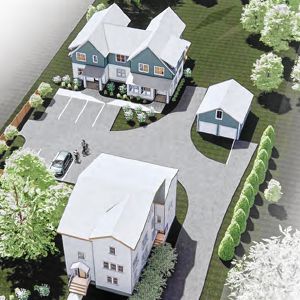 3-unit, 10-bed house in backyard called too much for Amherst historic district
3-unit, 10-bed house in backyard called too much for Amherst historic district
 Settling in on the streets: Six months on, Division of Community Care finding niche in Northampton
Settling in on the streets: Six months on, Division of Community Care finding niche in Northampton
 Valley writers shine in initial round of Mass Book Award competition: 12 area authors and author/illustrators long-listed for 2024 awards
Valley writers shine in initial round of Mass Book Award competition: 12 area authors and author/illustrators long-listed for 2024 awards
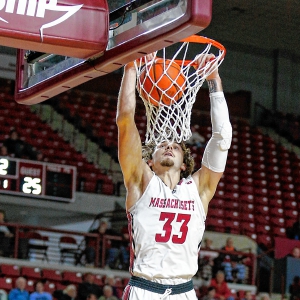 UMass basketball: Matt Cross announces he’s transferring to SMU for final year of eligibility
UMass basketball: Matt Cross announces he’s transferring to SMU for final year of eligibility
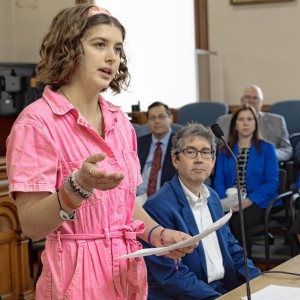 Democracy’s defense marches on: Constitutional lawyer, activist daughter highlight annual Law Day event
Democracy’s defense marches on: Constitutional lawyer, activist daughter highlight annual Law Day event
One concern Kinder mentioned was that fishing line gets caught in the catchment drain, with some residents wondering if a restoration of the dam might solve the problem. With two signs in place, one that states “use the area at your own risk” and another reading “fall hazard,” some residents proposed increasing education rather than issuing a ban on public use.
“I can’t help but notice that if so many people are using it, it’s because the dam has become a valued place for recreation in Shutesbury. I don’t think we’ve been presented with evidence that our use of the dam is damaging the dam,” said resident Carlos Fontes. “Is it possible to do some creative thinking to allow the dam to be used while minimizing risk?”
With the bylaw banning public access ultimately being voted down, Moderator Paul Lyons said the town has “an opportunity to explore” alternatives.
School officials presented Article 17, a $45,900 request for security cameras at the elementary school, as an added safety measure amid the “constant violence that we’re seeing in our country, in schools,” said Principal Jacqueline Mendonsa.
“We are probably one of the only schools in the area that does not have any sort of video equipment,” she said.
The cameras would be installed at exterior doors, with the live feed only being viewable from the front office. Only Mendonsa, Burgess and the school’s head custodian would have access to the footage, with Mendonsa noting there was an incident of vandalism last year.
“I was here when we debated whether or not we should lock our school doors,” recalled retiring School Committee Chair Dan Hayes, mentioning an increased sense of security for school employees, parents and students. “That was a tough decision. For me, putting cameras on the school doors is our responsibility.”
Although Bob Groves, a member of the Finance Committee and Capital Planning Committee, objected to the fact that the proposal came before town officials “very, very late in the game” less than a month ago, for which Hayes apologized, the spending request received support from the majority of residents. Others wondered if cameras are necessary in such a small town in a rural area.
“Every time [schools that experience active shooters] go back and talk about this, they never saw it coming,” Burgess rationalized. “And it doesn’t matter if they’re the biggest, most well-equipped school system.”
With residents voting in support of buying the camera system, Mendonsa said “the first order of business for the School Committee and school Policy Committee” will be to draft policies outlining the use of the cameras and storage of the footage.
The second to last article, a citizen’s petition put forward by MaryJo Johnson, solidified the town’s opposition to using artificial turf for the track and field project at Amherst-Pelham Regional High School for four reasons, as outlined by Johnson: health and safety, physical practicality, environmental responsibility and the uncertain future of artificial turf’s condition. Johnson cited the carcinogens, endocrine disruptors, neurotoxins, and per- and polyfluoroalkyl substances (PFAS) used in the production of artificial turf, as well as the chemicals needed to maintain the material, when outlining her health safety concerns.
“There is no PFAS-free artificial turf,” Johnson said, adding that, based on her research, natural turf would be half the price. “There is no safe artificial turf, just like there is no safe level of exposure to PFAS.”
Although Finance Committee Chair Ajay Khashu mentioned the limitations of using natural turf, which needs to rest after storms, the majority agreed with sending a message in support of natural turf.
“It’s striking that just hours ago we allocated money toward PFAS remediation,” commented Michael DeChiara, who serves on the Energy & Climate Action Committee and Planning Board. DeChiara was referencing Article 10, in which residents agreed to apply for a no-interest loan from the state for up to $150,000 for PFAS mitigation efforts in town, centering on Leverett, Wendell and Pelham Hill roads around the Fire Station. “If nothing else, it seems like that would be a motivator.”
Article 13 requested to transfer up to $100,000 from Capital Stabilization for a new asphalt roof at Shutesbury Elementary School, was passed over. Torres explained the Select Board allocated $300,000 toward the project, and the town earned another $200,000 earmark through Sen. Jo Comerford, which should cover the full cost of the project based on the low bid of about $400,000.
Voters also gave their blessing to:
■Beginning the process of exploring community choice aggregation that could provide residents with more green-sourced electricity while also potentially lowering electric bills;
■Increasing the number of Recreation Committee members from seven to nine (a number that was amended from the originally proposed 11);
■A $6.91 million municipal operating budget for fiscal year 2024, which represents a 3.4% increase over this year’s $6.68 million budget and would put the tax rate at $19.16 per $1,000 valuation;
■Borrowing $120,000 for a new backhoe for the Highway Department, after an amendment to transfer the money from the Stabilization Account instead was voted down.
Reach Shelby Brock at sbrock@recorder.com or 413-930-4277.
 Doors open at Tilton Library’s temporary home at South Deerfield Congregational Church
Doors open at Tilton Library’s temporary home at South Deerfield Congregational Church Area property deed transfers, May 2
Area property deed transfers, May 2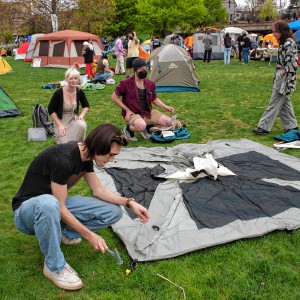 Pro-Palestinian encampment disperses at UMass, but protests continue
Pro-Palestinian encampment disperses at UMass, but protests continue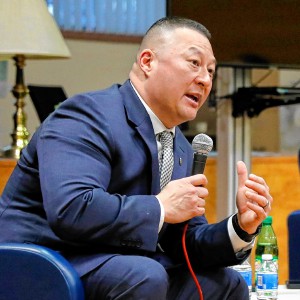 Amherst council confirms Gabriel Ting as police chief
Amherst council confirms Gabriel Ting as police chief
